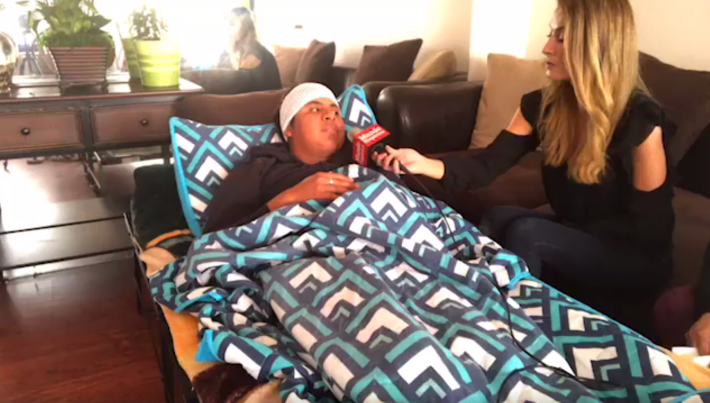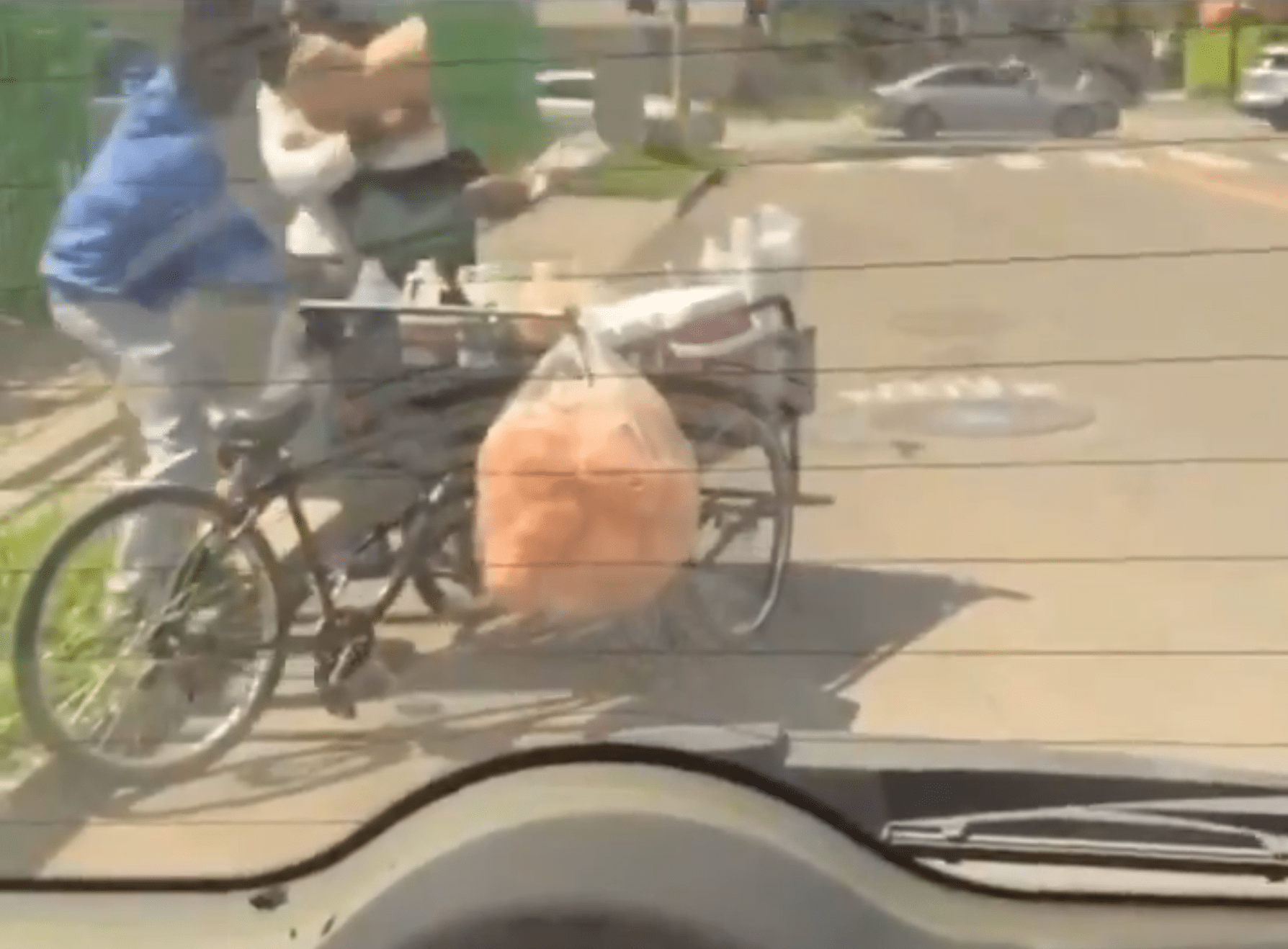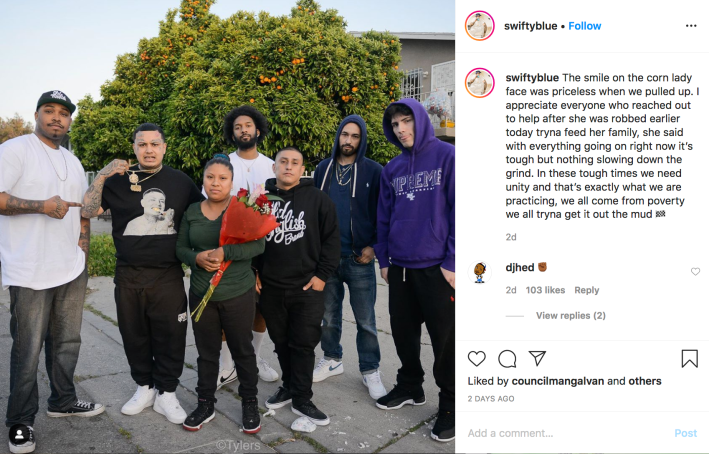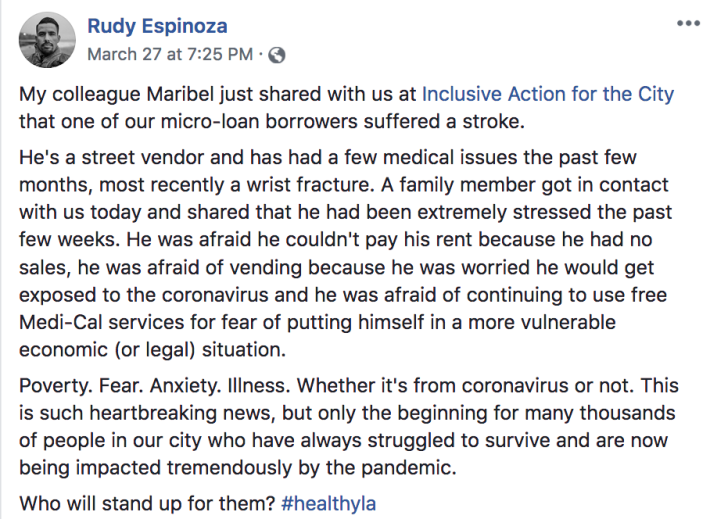The video of South Central elotera Amaris Méndez being physically attacked and robbed at the corner of 92nd and Figueroa outraged community members this weekend.
The footage, shot from inside the car the thieves would drive off in, shows one of the attackers pacing nervously as he waits for the coast to clear so he can make his move.
When he finally launches himself at her, putting her in a chokehold, his companion springs into action, trying to snatch whatever earnings he can from her as she screams in terror.
Inside the car, the female videographer is unmoved, uttering only a low "ooooooohhh" as the young men return to the vehicle and the group makes their getaway.
SAD pic.twitter.com/a8VZZGKVle
— FOOS GONE WILD (@foosgonewild) March 28, 2020
The thieves' live broadcast of the assault and the way they joked about it later in live chats proved to be their downfall. Commenters told them they'd messed with the wrong neighborhood. And, as reported by Javier Cabral over at L.A. Taco, it wasn't long before there was a report of shots fired near an address a woman involved in the incident had let slip during one of her live chats.
Vigilante justice may have been a bit too effective, as Méndez explained to Armida López (below) - the youth had apparently fled the address that was leaked online and police have yet to apprehend them.
Those interested in helping Méndez moved just as quickly.
Before the end of the weekend, she had been identified, a gofundme had been set up, and rapper Swifty Blue (second from left, below) had met with her to lift up her story, give her $1000, and call upon other rappers to do the same with people struggling in their own neighborhoods. [Click on the image to visit his original IG post.]
Still, the idea of going back out on the street is not one she seems to be ready to contemplate. She had been traumatized, as she explains below, and was acutely aware of how vulnerable she was.
It would be one thing if thieves came at her and let her know they were going to try to rob her, she says in Spanish. Then at least she could try to defend herself. But when they just jump her out of nowhere this way - how could she protect herself against that?
It's no wonder she told López (above) that she was looking for other work.
Not only does she not want to be assaulted again, she is likely aware she could be a victim of retaliation if she returns to the same corner or is recognized in the area.
Vendors like Méndez are indeed incredibly vulnerable, even during the best of times.
Most are immigrants (often undocumented) or other folks of color who live on the margins, averaging around $10,000 a year in income. They often work alone and may set up before dawn, when there are fewer eyes on the street. And they are less likely to report crimes for fear of retaliation, deportation, receiving a citation themselves, and/or having their livelihoods confiscated - all of which makes them an easy target.
And all the notoriety in the world does not keep them safe.
Readers will likely recall the 2018 assault on another elotero, Benjamín Ramírez, in the Hollywood area by a racist Carlos Haka. Haka harassed Ramírez, insulted and threatened him, came at him with a stun gun, then tipped over and damaged Ramírez' cart.
As video of the attack went viral, the community rallied around him, including Javier "JP" Partida and Art Ramírez (no relation) of the Los Ryderz Bike Club, who built Ramírez a new cart.
National attention wasn't enough to keep Ramírez safe, however. He would later report he had not actually used the cart because he was so afraid someone would take it from him. And he would be assaulted again less than a year later, this time physically.
As in Méndez' case, the thieves first pretended to be customers, buying raspados from him. When he went to give them their change, they beat him (while wearing studded gloves) and took everything he had – about $180. He was left with skull fractures and questions about how he was going to safely make a living.

The order for people to shelter in their homes means there are fewer eyes on the street these days. And with city council approving what effectively amounts to a moratorium on street vending earlier this month, vendors are even less protected than usual.
And yet many feel they have little choice but to be out in the streets.
They won't be receiving federal or state assistance, will struggle to access city assistance, and are the least likely to be able to pull together paperwork to prove to their landlords that they have endured a loss of income due to the pandemic - something they will need to do to avoid eviction or penalization for late/non-payment of rent this month.
Knowing most would have little-to-no savings and few prospects for revenue-generation on the horizon, vendor advocates felt they had to act.
The moment of clarity came a couple of weeks ago for Rudy Espinoza, Executive Director of Inclusive Action for the City, when yet another vendor came in to his office seeking a loan through their Semi'a Fund micro-loan program. The fund has proven an essential resource for vendors looking to establish or expand their small businesses. But as he listened to city council call for stringent compliance with the health permitting process - a move that will likely hamper food vendors' ability to practice their trade even after the pandemic emergency passes - Espinoza knew he couldn't in good conscience offer a man a loan that he might never be able to pay back.
So Inclusive Action, in collaboration with the East L.A. Community Corporation and Public Counsel, launched the Street Vendor Emergency Fund to provide direct cash assistance to vendors. The fund already has $50,000 in seed money from the United Way's Pandemic Relief Fund, but the team also set up a gofundme to supplement that pot. With tens of thousands of vendors in need, and over 400 that have already sought assistance, they know the seed money will only stretch so far.
As of now, they plan to offer $400 on a pre-loaded Mastercard to each eligible street vendor.
The money can't come soon enough. A few days ago, Espinoza posted on Facebook about a vendor that had already been struggling with health and money issues who recently suffered a stroke.
Unfortunately, rents are high enough in L.A. that $400 will likely not be enough to keep a vendor from having to be out in the streets. But it may make it easier for them to keep their families fed and their phones on, and offer some peace of mind at a moment that it feels like their city has forgotten them (as vendor and Emergency Fund committee member Don Faustino explains below).
_______
For more on the Street Vendor Emergency Fund and how to launch your own fund, please see Inclusive Action's blog post here. Donate to the emergency fund gofundme here.








